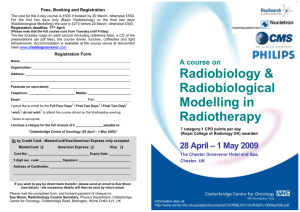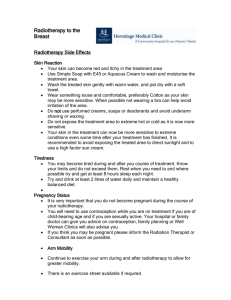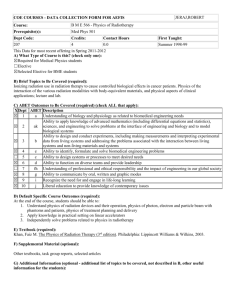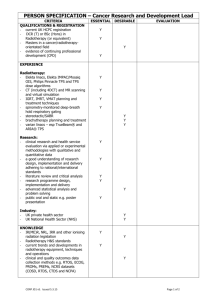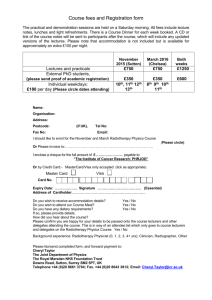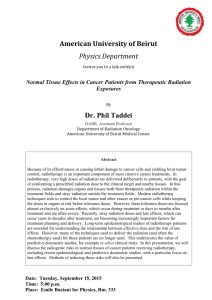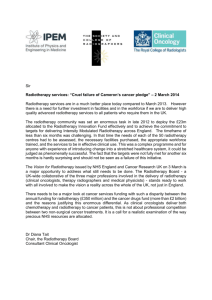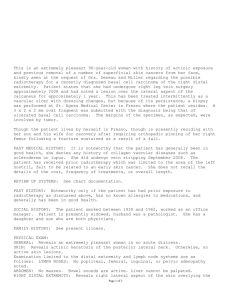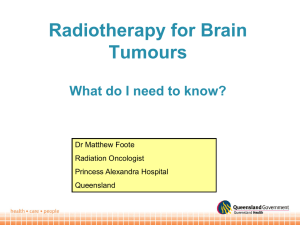See details
advertisement
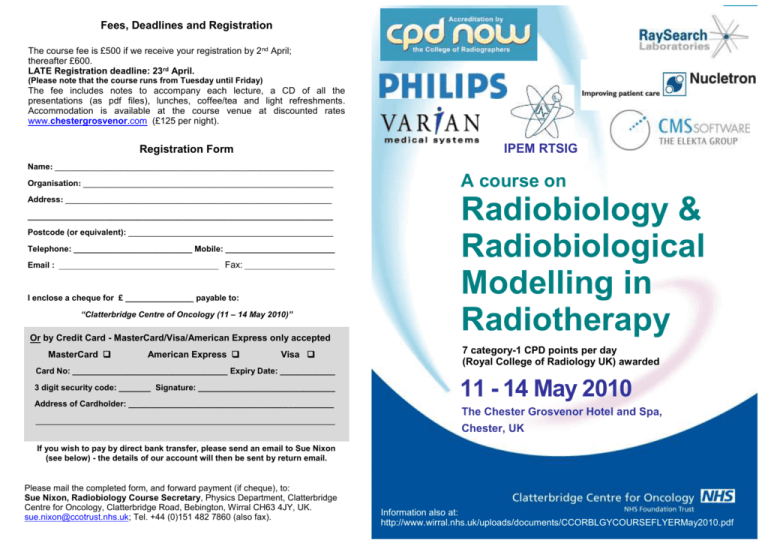
Fees, Deadlines and Registration IPEM RTSIG Tel/fax: +44 (0) 151 48 7860 Email: sue.nixon@ccotrust.nhs.uk The course fee is £500 if we receive your registration by 2 nd April; thereafter £600. LATE Registration deadline: 23rd April. Tel/Fax: +44 (0)151 482 7860; Email: Sue.Nixon@ccotrust.nhs.uk (Please note that the course runs from Tuesday until Friday) The fee includes notes to accompany each lecture, a CD of all the presentations (as pdf files), lunches, coffee/tea and light refreshments. Accommodation is available at the course venue at discounted rates www.chestergrosvenor.com (£125 per night). IPEM RTSIG Registration Form Name: ____________________________________________________________________ Organisation: _____________________________________________________________ Address: _________________________________________________________________ ___________________________________________________________________ Postcode (or equivalent): __________________________________________________ Telephone: __________________________ Mobile: ________________________ Email : _______________________________________ Fax: ______________________ I enclose a cheque for £ _______________ payable to: “Clatterbridge Centre of Oncology (11 – 14 May 2010)” Or by Credit Card - MasterCard/Visa/American Express only accepted MasterCard American Express Visa A course on Radiobiology & Radiobiological Modelling in Radiotherapy 7 category-1 CPD points per day (Royal College of Radiology UK) awarded Card No: __________________________________ Expiry Date: ____________ 3 digit security code: _______ Signature: ______________________________ Address of Cardholder: _____________________________________________ _________________________________________________________________________ 11 - 14 May 2010 The Chester Grosvenor Hotel and Spa, Chester, UK If you wish to pay by direct bank transfer, please send an email to Sue Nixon (see below) - the details of our account will then be sent by return email. Please mail the completed form, and forward payment (if cheque), to: Sue Nixon, Radiobiology Course Secretary, Physics Department, Clatterbridge Centre for Oncology, Clatterbridge Road, Bebington, Wirral CH63 4JY, UK. sue.nixon@ccotrust.nhs.uk; Tel. +44 (0)151 482 7860 (also fax). Information also at: http://www.wirral.nhs.uk/uploads/documents/CCORBLGYCOURSEFLYERMay2010.pdf Teaching faculty Don Chapman PhD, Penticton, BC Canada (formerly Head of Radiobiology research, FoxChase Cancer Centre, Philadelphia) – Fundamentals of (experimental) cell radiobiology; the Linear-Quadratic model; influence of the tumour microenvironment; LET and track structure. Dr. Christopher Nutting, Royal Marsden Hospital and Institute of Cancer Research, Sutton, UK – radiobiological considerations in Head&Neck radiotherapy. The course provides an understanding of both the scientific basis of radiation treatment for cancer and the use of radiobiological models in the evaluation and optimisation of radiotherapy treatment plans. It is suitable for all professionals involved in Radiotherapy: Clinical/Radiation Oncologists, Physicists, Therapy Radiographers, Researchers and University Teachers. Days 1 and 2 will cover fundamentals – clonogenic assays, cellular response to radiation, the effect of doserate, radiation quality (LET) and protons/light ions, cell-cycle effects, the influence of oxygen, the linear-quadratic (LQ) model, the principles of fractionation, specific considerations in LDR and HDR brachytherapy, clonogen proliferation and treatment-gap compensation. Radiation Oncologists specializing in breast, head&neck, lung and prostate tumours will discuss the application of the latest radiobiological ideas to these specific cancers. Days 3 and 4 are dedicated to the fundamentals of (radio)biological models (TCP, NTCP, EUD) and their application to the evaluation and optimisation of radiotherapy treatment plans. The course includes extensive hands-on practice in a “computer lab” with modeling software (LQ-survivor; BIOPLAN; BIOSUITE and ORBIT) similar to that which is now starting to appear in commercial treatment planning systems. Dr. Marco Schwarz, Agenzia Provinciale per la Protonterapia, Trento, Italy - Use of EUD, TCP, NTCP in optimising treatment plans; Individualising prescription dose to lung tumours based on NTCP. The faculty comprises Radiobiologists, Physicists and Radiation Oncologists who are internationally known for their research and are experienced teachers of the various aspects of Radiobiology and its application to Radiotherapy. Dr. Catharine West, Academic dept. of Radiation Oncology, Christie Hospital and Univ. of Manchester, UK – The Genomic Revolution and Radiotherapy. Students are strongly encouraged to bring posters describing Radiobiological Modelling work from their own departments; these will be displayed during the course. Professor Roger Dale, Imperial College, London – Radiobiology of Brachytherapy, models for effects of different doserates; The interaction of Chemo- and Radio-therapy. Dr. Charles Deehan, Guys and St. Thomas’ NHS Trust, London – Isoeffect calculations for different fractionation regimens; Corrections for gaps in treatment schedules. Prof. Dirk de Ruysscher, Maastricht – radiobiology in optimising lung tumour radiotherapy. Professor Jack Fowler, London – clonogen proliferation and strategies to counteract it. Prof. Trevor McMillan, Lancaster Univ., UK - DNA damage and repair due to radiation. Professor John Yarnold, Royal Marsden Hospital and Institute of Cancer Research, Sutton, UK – radiobiological consideration in the radiotherapy of breast cancer. Dr. Ellen Yorke. MSKCC, New York, NY, USA – Models for predicting Normal-Tissue Complication Probability (NTCP) – conceptual basis, mathematical formalisms. The QUANTEC update of the ‘Emami’ parameters in NTCP models; Dr. John Fenwick, CCO and Liverpool university – Statistical methods, parameter extraction in Dose-Volume-Complication analyses; Delay-Differential Equations and DoseTime dependence for tumour control and early reactions. Dr. Andrzej Kacperek, CCO – Heavy-Particle Therapy (protons, carbon ions, neutrons): physical and radiobiological aspects. Dr. Geoff Lawrence, CCO – Cancer induction by radiation; application to radiotherapy treatment plans. Professor Alan Nahum, CCO – Introduction to Biological models in Radiotherapy; Tumour local control probability (TCP) models; Applications of TCP modelling. Dr. Isabel Syndikus, CCO – Radiobiological considerations in prostate radiotherapy Professors Wolfgang Tomé and Robert Jeraj, U. of Wisconsin, Madison – guest lecturers on radiobiological optimisation and the use of functional imaging respectively. Kjell Eriksson, of RaySearch Laboratories (www.raysearchlabs.com; Stockholm), ‘biological’ optimization software specialists (e.g. Pinnacle; Oncentra/Masterplan; Eclipse), will run practical exercises on using biological models in plan evaluation and optimisation. VENUE All the lectures and computer sessions will take place at The Chester Grosvernor and Spa, Eastgate, Chester CH1 1LT, Cheshire, UK (www.chestergrosvenor.com). This is in the heart of the old Roman city of Chester, some 25 miles from Liverpool, and within easy reach of both Manchester and Liverpool airports. On request it will be possible to visit the modern, spacious Radiotherapy facilities at CCO, which include the UK’s only proton-therapy facility as well as cone-beam and 4D CT. Course Organisers: Prof. Alan E. Nahum, Physics Dept. and Consultant Dr. Pooja Jain, Radiotherapy Dept., Clatterbridge Centre for Oncology alan.nahum@ccotrust.nhs.uk; tel: +44 (0)151 334 1155 extn. 4169 pooja.jain@ccotrust.nhs.uk; tel: +44 (0)151 334 1155 extn. 5915.
